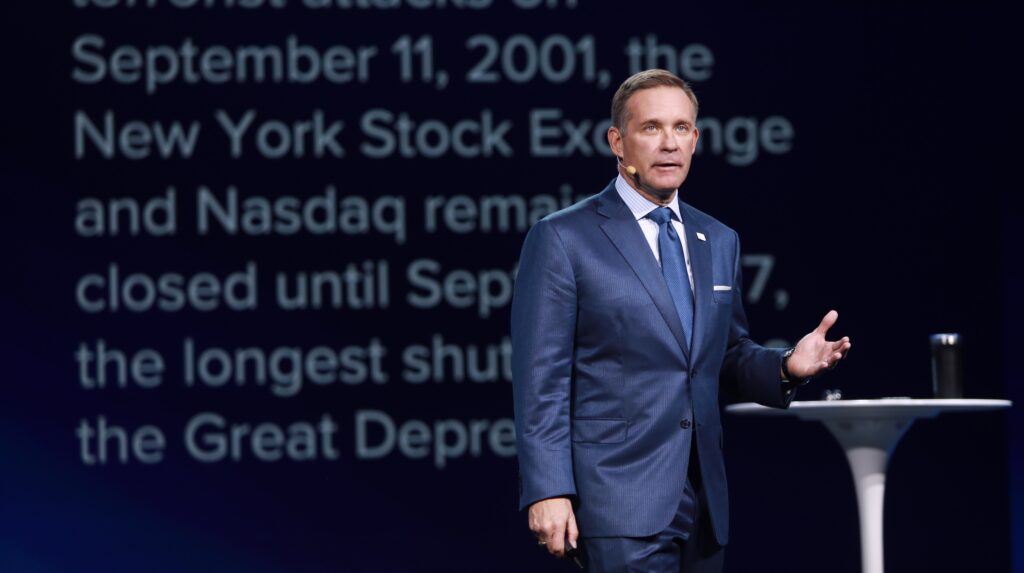
With the S&P 500 falling and only having one winning week in nine (as of June 6, 2022), many wary investors may be considering pulling their money out before it gets even lower, and where ‘buy the dip’ has quickly transitioned to ‘sell the rip’ as fear and uncertainty settles in, this proposition rarely works out according to plan.
Most investors sell too early and buy back too late, erasing any opportunity to recoup their investment. During market downturns, it’s best to focus on the fundamentals of investing science, which can help keep investors on a path to achieving their goals even when their primordial instincts are telling them to cut their losses and get out. “It’s not about the next 20 minutes, it’s about the next 20 years.” Mark Matson states.
At Matson Money, we adhere to the Free Market Portfolio Theory™, which synthesizes three academic principles: Efficient Market Hypothesis, Modern Portfolio Theory, and the Three-Factor Model to help keep investors disciplined regardless of market cycles. Together, these principles serve as the basis for our globally diversified portfolios.
By following Nobel Prize-winning investment research, investors can stay disciplined during market downturns and on track.
Efficient Market Hypothesis
First explained by Eugene F. Fama in 1965, EMH runs counter to what many in the media—and popular culture—believe, that the market is inefficient. Instead, Fama’s theory argues that at any given point in time, the actual price of a security is a good estimate of its intrinsic value. Since markets are forward-looking, investors who respond to market forces by selling when prices go down are behaving counterintuitively because they’re reacting to what’s already happened, not what’s ahead. Investors should remember: Ups and downs are already factored into the price of a stock. Instead of responding to emotions and thinking of the stock market as a game of buying and selling a few big-name stocks at the right time, investors should invest in structured funds designed to help reduce risk and diversify prudently.
Modern Portfolio Theory
Based on the work of Harry Markowitz, Merton Miller, and William Sharpe, MPT theorizes that diversification increases returns, not risks, by identifying assets with low correlations. Unfortunately, many investors focus myopically on U.S. equities, loading up on familiar tech stocks—feeding into herding bias—when they should focus on investing and diversifying on a global basis.
The Three-Factor Model
In 1991, leading economists Eugene F. Fama and Kenneth French conducted research into the sources of risk and return. Grounded in Efficient Market Hypothesis, their research found that a portfolio’s exposure to three simple but diverse risk factors—market factor, size effect, and value effect—determines how it will perform. When constructing portfolios, the Three-Factor Model can help determine the allocation between equities and fixed income, small and large equities, and the balance between value and growth equities. By rebalancing into short-term fixed income, investors can offset volatility and set themselves up to buy into equities later when the market goes down—effectively becoming buyers in a world of sellers. By investing globally, instead of focusing on the next hot U.S. growth stock, investors can protect their portfolios.
“History is precise on this,” says Matson. “No one can tell you where the next 20% movement is going to be – whether it’s up or down – but we know throughout history the next 100% is up.” When it comes to money and investing, following empirically tested Nobel Prize-winning principles, and not being tempted to make potentially disastrous decisions around your portfolio, can help investors stay on track to achieving their long-term financial goals.
For our Founder & CEO Mark Matson’s take on how investors should position portfolios in light of the longest losing streak, the S&P 500 had seen in 90 years and the Nasdaq had seen in 21 years, take a look at his recent interview with FOX Business’ Maria Bartiromo: https://www.matsonmoney.com/matson-money-is-there-anywhere-to-hide-from-a-volatile-market/.
Disclosures
This content is based on the views of Matson. The concepts discussed herein are for educational purposes only. This content includes the opinions, beliefs, or viewpoints of Matson Money and its Co-Advisors and should not be relied upon for entering into any transaction, advisory relationship, or making any investment decision. Other organizations or persons may analyze investments and the approach to investing from a different perspective than that reflected in this content. Nothing included herein is intended to infer that the approach to investing discussed in this content will assure any particular investment results.
This Presentation includes historical performance information from various global stock market indices. Market performance information is included in this presentation solely to demonstrate the potential benefits historically associated with diversification of asset classes and does not represent or suggest results Matson Money would or may have achieved when managing client portfolios. Investors cannot invest in a market index directly, and the performance of an index does not represent any actual transactions. The performance of an index does not include the deduction of various fees and expenses which would lower returns.
Although the referenced indices are not intended in any way to be viewed as model performance of Matson Money, you should understand that actual client portfolios are subject to the deduction of various fees and expenses which would lower returns. Advisory fees charged to Matson Money clients, whether directly or indirectly through a mutual fund, are described in Matson Money’s Form ADV Part 2A and Form CRS, available at www.matsonmoney.com. PAST PERFORMANCE IS NO GUARANTEE OF FUTURE RESULTS.
The Nobel Memorial Prize in Economic Sciences, commonly referred to as the Nobel Prize in Economics, is an award for outstanding contributions to the field of economics, and generally regarded as the most prestigious award for that field.
Markowitz, Harry. “Portfolio Selection.” Journal of Finance. 1952.
Harry Max Markowitz is an American economist, and a recipient of the 1989 John von Neumann Theory Prize and the 1990 Nobel Memorial Prize in Economic Sciences. Markowitz is a professor of finance at the Rady School of Management at the University of California, San Diego.
Efficient Market Hypothesis, first explained by Dr. Eugene Fama in his 1965 doctoral thesis.
Eugene F. Fama, “Random Walks in Stock Market Prices,” Financial Analysts Journal, September/October 1965.
Eugene F. Fama, 2013 Nobel laureate in Economic Sciences; is widely recognized as the “father of modern finance.” His research is well known in both the academic and investment communities. He is strongly identified with research on markets, particularly the Efficient Markets Hypothesis.
Eugene F. Fama, Kenneth R. French, “The Cross-Section of Expected Stock Returns,” Journal of Finance 47, No. 2, (June 1992); Eugene F. Fama, Kenneth R. French, “Common Risk Factors in the Returns on Stocks and Bonds,” Journal of Financial Economics 33, No. 1, (February 1993); Eugene F. Fama, Kenneth R. French, “Profitability, Investment and Average Returns,” Journal of Financial Economics 82, No. 3 (December 2006); Eugene F. Fama, Kenneth R. French, “A Five-Factor Asset Pricing Model,” Journal of Financial Economics 116, No. 1 (April 2015);
Three Factor Model
Fama, Eugene F. and Kenneth R. French. “The Cross-Section of Expected Stock Returns,” Journal of Finance, 47, June 1992.
Efficient Market Theory
Eugene F. Fama, “Random Walks in Stock Market Prices,” Financial Analysts Journal, September/October 1965.
Modern Portfolio Theory
Markowitz, Harry. Portfolio Selection: Efficient Diversification of Investments. New York. Wiley. 1959. Print.




